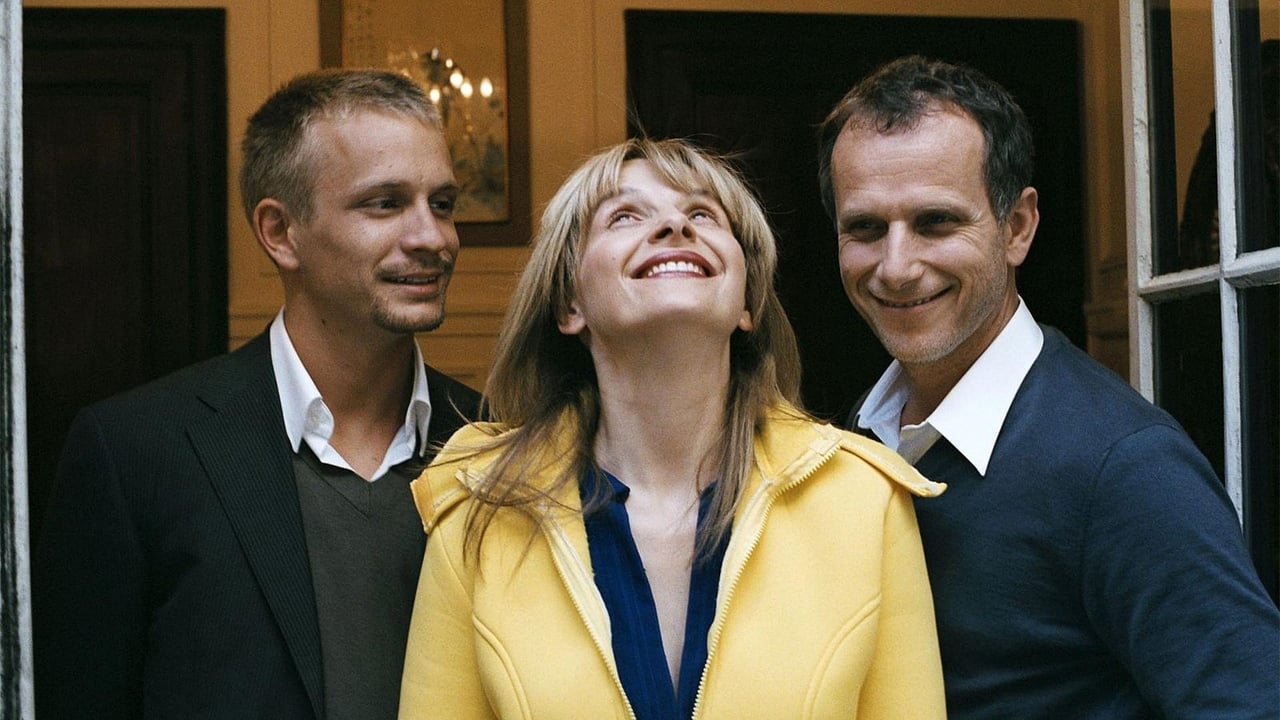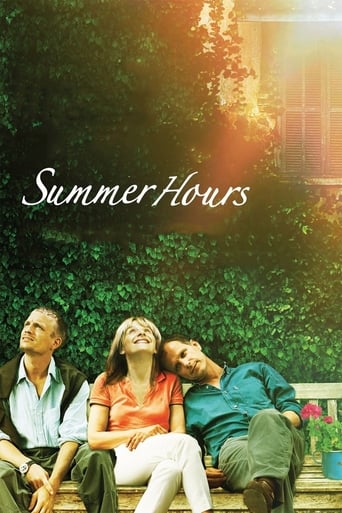



Intense, gripping, stylish and poignant
A very feeble attempt at affirmatie action
While it doesn't offer any answers, it both thrills and makes you think.
View MoreOne of the best movies of the year! Incredible from the beginning to the end.
View MoreI love Juliette Binoche's acting, but she can't save a film from its self-destructive implosion. French viewers and critics (non-French Franco-philes) too often use the crutch of contrasting negatively American films with French films. French films have depth and great acting ad nauseam. I have seen many, many French films over the years and even the best (I read reviews before viewing them) are usually just above average, same as America or British films. Ironically, one of Binoche's best performances is in the American film, Dan in Real Life. She is also quite good in the adventure film The Horseman on the Roof, a very, very good film. Anyway, Summer Hours has a Bergman feel, but none of his story telling ability and very little of the performances he elicits from actors and actresses. Not a winning film.
View MoreA film about talented rich people squabbling, albeit very gently, about an inheritance would normally be a candidate to make my hackles rise. But 'Summer Hours' is a sensitive, subtle movie, that explores non-judgmentally what is important to us, and why: in short, how we define our emotional identities. The characters seem likable, but display an ordinary selfishness, and the film lightly samples the passions that make each of them tick. It's a very wordy movie, so much so, it could almost have been a stage play, but the director has a great sense of place, evoking his characters own feelings for place and the movie never feels heavy. In one sense, the ending is a touch underwhelming; but in keeping with the film's overall style. I liked it, a lot: the sort of film that only the French seem to make.
View More"Summer Hours" begins, appropriately, with hordes of children running joyfully through a garden. They're on a treasure hunt, following a map written in invisible ink.Director Olivier Assays then introduces us to Helene Berthier, an elderly woman whose children and grandchildren have gathered at her home in rural France. Helene was once romantically linked to a character called Paul, a now dead artist who was renowned for his paintings.Helene's home is filled with both Paul's work (a vast collection of priceless art) and more mundane personal items which nevertheless have tremendous sentimental value. One photograph, for example, features an older generation of Berthiers sitting at a table exactly as the current generation are. As the film unfolds, Assayas lays the groundwork for various heavy themes: the way what we "treasure" changes as we age, how art and objects tie people to the past, the relationship between art, globalisation and commerce, the seemingly arbitrary and shifting "value" of objects, the question of what defines art and what makes art meaningful, how spaces are "deterritorialized" and "reterritorialized" under capitalism, how objects transform as they move from space to space etc etc. You might say this is the "rural" version of Assayas's "Demonlover", "Clean" and "Boarding Gate", but whilst those films focused on the way humans are stripped, sold, traded and pushed around under techno-capitalism, "Summer Hours" focuses almost entirely on man's fluctuating relationship with both inanimate objects and product.Early in the film, Helene reveals the reason for calling a family assembly: she wants to discuss the fate of the family estate after her death. Frederic, Helene's eldest son, is an economist, and is the only family member who wishes (for sentimental reasons) to hold on to the estate and its artwork. Daughter Adrienne (a product designer) and younger son Jeremie (who works for a mega corporation in Shaghai) both want to sell the estate. It's of no value to them, they won't be able to visit it as they work far abroad, and it simply isn't economical to maintain. Frederic doesn't agree with them at first, but gradually the practical needs of commerce infringe on his desire to hold on to the past. Reluctantly he agrees with them. Significantly, Adrienne, the product of a system which destroys the past and sells nostalgic copies, makes tacky ceramic ornaments based on the designs of her uncle. Assayas stresses that the children are all ultra-modern bourgeois, part of a "new France" that is beholden to the demands of the global market and that is gradually losing ties with its traditions and heritage. Casual remarks highlight this theme: characters speaking of new companies popping up in their village, once taboo romantic relationships accepted as the norm, the fact that Adrienne lives in two of the citadels of Global Capitalism (New York and Japan), the fact that Jeremie is moving his family to China to better manage a mass production shoe factory and the mention that Jeremie's children will learn English and not speak French (thereby cutting them off from their cultural roots). Ironically, it's the one economist in the family who can't cope with the way his family, culture and historical treasure trove are being torn apart. Frederic frequently states that he believes the "economy as a functional system" is a myth. He recognises that economism is the new global religion, in which the world is reordered in the service of irrational and incessant growth. The dominant theology of this religion is neo-liberalism, which aims to make the whole world a single market, national boundaries no longer a factor in economic affairs. Unlike most religions, economism looks to growth for salvation, salvation being "freedom" from poverty and the ills that accompany it. When it is pointed out that the "new religion" has not in fact done much toward reducing poverty, believers are told that they must be more faithful to the precepts of the religion. Of course while the believers wait, the machine's greed outgrows the capacity of the real economy to satisfy. In response, the great centres of finance get the governments of the world to make available to them, by privatisation, all of their possessions. But still this does not suffice! How could it? Debt based Ponzi schemes cannot be satiated. And so the market becomes increasingly abstract, debts ignored or traded as "value" whilst virtual economies balloon to something like five times the size of the "real" economy. The end result is the world Assayas' characters find themselves in: groundless and always moving to keep the whole sham from collapsing.In one scene, Frederic proudly displays paintings for his children, telling them that one day the collection will be all theirs. But though his kids look up at the artwork with indifference, implying that they are "cut off" from the "treasures of the past", Assayas is careful to show that Frederic is himself deluded, unable to look upon the pictures without bias. His pleasure is clearly less about the aesthetic qualities of art/past, than it is about family legacy, memory and the continuation of a family history. His children, able to look at the paintings without bias, simply dismiss them as old-fashioned. The result is that the film manages to mourns the obliteration/repackaging of the past whilst also questioning if anything is really being lost. Does the worth of an object reside only in the historical and familial remembrances of concerned individuals?The film ends with a sequence which mirrors its first shot. Here Helene's granddaughter looks on at the abandoned family home, trying but failing to position her body such that it recreates a "painting of the place" that Paul once did. It's a deeply sad ending; no longer connected by shared place or possessions, the modern subject is both adrift and defined by loss. 8.9/10 – A great film, though perhaps too word oriented.
View MoreThis film has a soft, subtle tone set forth by the matriarch of the family, wonderfully cast as and gracefully played by Edith Scob. If I tick off some of the plot points, the film seems like it could be one mustering a lot of blustering emotion, but it never really does.Thus I am actually a bit taken aback by the notions that this is a film of a dysfunctional family. Sure the family is fragmented, as is any family as its members not only grow up, but necessarily grow apart. If anything, I think this film is gentle in addressing that. I actually thought the family was strikingly functional, at least by cinematic standards.Anyways, here come the spoilers, I'd certainly recommend watching this film, ideally before reading any further...In the film we have1) the death of said matriarch2) an ensuing disagreement on what to do with the inheritance3) notions of a scandalous affair involving the matriarch and her famous artist uncle4) the matriarch's granddaughter gets arrested for shoplifting and possessionIn particular, #2 above is propped up as a potential explosive point, but the two brothers and one sister seem to reconcile their disagreements with extreme civility, and indeed despite the elder son's executor intentions, the family ends up choosing what the mother had wisely selected. Surely a sobering decision for her, and I think the crux of the film.A lot of the above tensions are actually resolved off screen, again I think putting the focus off any sort of familial fireworks.So while we may see the wild, farewell-to-the-estate party by the granddaughter and her cohorts as oblivious to the treasures that were once housed there, there is a moment out in the tall grass, where the granddaughter recollects her ancestor's memories, and a subtle shade of the love that touched a young Helene was more memorable than any future museum piece she may have touched. Helene passed that moment somehow through to her granddaughter, framed not in a canvas, or even in the light as it struck the model of the original picture, but in sensation of that specific moment.Are such moments what are hopes to capture, if not inspire?In contrast, the desk that leaves the estate for the museum is then shown partially occluded on screen and largely ignored by the throngs that press past it. Look, I love museums myself, but even more so I love the people I attend them with. Watch this film with one of those people (my wife also enjoyed this film, subtitles and all!)
View More